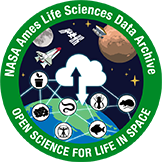
Ames Life Sciences Data Archive
The Ames Life Sciences Data Archive (ALSDA) is the official repository of non-human science data generated by NASA's Space Biology Program and Human Research Program, located at NASA Ames Research Center in California's Silicon Valley. The Project is responsible for archiving, collecting, curating, and making available space-relevant higher-order phenotypic datasets. These datasets span a broad range of biological levels involving data from tissues, organs, whole organisms, physiology, and behavior.
ALSDA recently modernized and retooled its systems and processes to improve its adherence to FAIR principles and, as a result, maximize the potential science return on all legacy and future data collections. It has integrated into the NASA's Space Biology Open Science group of projects to utilize a suite of new tools and workflows to improve data accessibility and reusability.
These new tools include implementing updated data management plans, automating data submission agreements, adopting a single-point-of-entry data submission portal, and federating data through the Biological Data Management Environment and NASA's Life Sciences Data Archive. As ALSDA physiological-level datasets are published (e.g., micro-computed tomography, histology, intraocular pressure, hormonal assays, immunostaining, and ultrasonography), the merging of hierarchical organizations of biological complexity from spaceflight will enable new knowledge discovery approaches.
History and Background
Life sciences research has been conducted by NASA both in space and on the ground for over 30 years. The range of research is extensive, from basic cellular biology to applied biomedical studies. While nearly all of these scientific studies have been summarized in technical reports, books, and journals, the LSDA is the first integrated, systematic effort to collect and catalog data and factual information using archival methodologies.
The purpose of the archive is to acquire, store, maintain, and distribute all information obtained from NASA-funded human and non-human life sciences investigations. The archive enables scientists to perform retrospective analysis across missions, experiments, life science disciplines, research subjects, and species. The LSDA may be of interest not only to current researchers in the space life science community, but to those interested in general interdisciplinary research and those who are studying certain disease processes (such as muscle atrophy and bone demineralization) that are mimicked in space in healthy individuals.
Efforts to form the LSDA began in 1990. In the prototype phase for the repository, which was completed in December 1994, data collected from the Space Life Sciences-1 mission were used as the basis for developing the systems and methods for archiving mission data. Raw, analyzed, and summarized data were captured for the 18 primary experiments conducted on Space Life Sciences-1, and summarized data were captured for 32 Biospecimen Sharing Program experiments associated with the mission. Since that time, summary data for all Life Sciences flight experiments flown through 1998 (ARC, JSC, KSC) have been added to the LSDA.
- Ames Research Center (ARC) in Silicon Valley, California – focuses on animal and microbial research in space
- Johnson Space Center (JSC) in Houston, Texas – focuses on human subject research in space
- Kennedy Space Center in Cape Canaveral, Florida – focuses on plant research in space
The Ames Life Science Data Archive (ALSDA) is a repository for NASA funded, non-human, life sciences flight and ground research investigations, which is managed by the Space Biology Program and the Human Research Program . The objectives of the ALSDA are to archive life sciences data; allow users to compare data across missions, experiments, and disciplines; and support queries for locating, retrieving, or requesting data. ALSDA also serves as the custodian of the Biospecimen Storage Facility and the Collaborative Life Sciences Repository – a cloud technology resource. Access to data is critically important to expanding the knowledge base of human exploration, translational medicine, and basic discoveries in the area of space biology.
The role of ALSDA is to meet NASA's Space Life Sciences primary goal, which is to apply scientific knowledge and technology to improve our nation's competitiveness, education, and the quality of life on Earth and in space. This project is focused on the identification, integration, management, and availability of life sciences information and surplus specimens generated from non-human flight and ground experiments. The archiving and preservation of research experiment information, biospecimens and associated data, and making these materials accessible to the research community are governed by NASA policy directives and procedural requirements.
Questions?
Contact the ALSDA team at arc-dl-alsda@mail.nasa.gov





